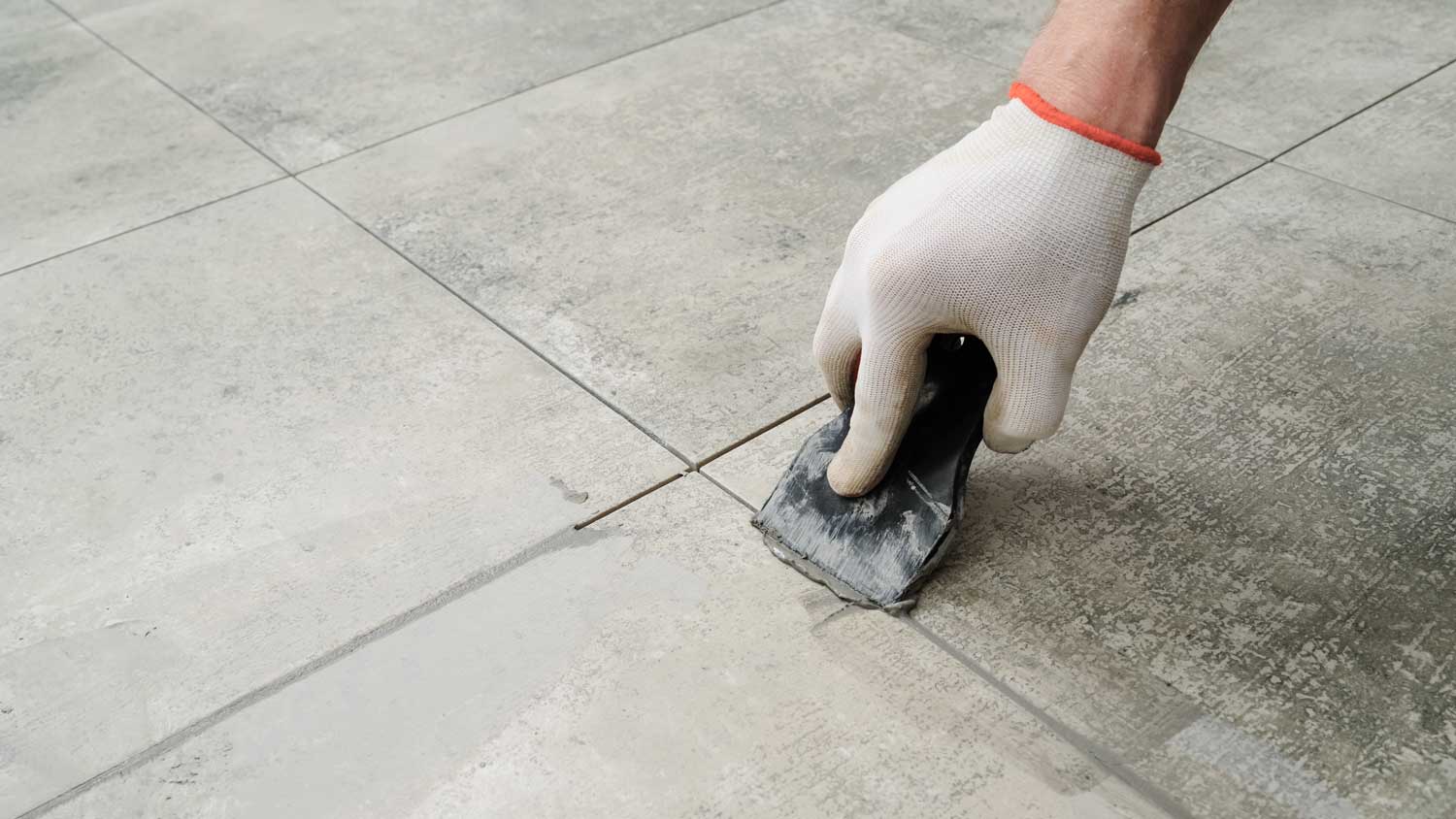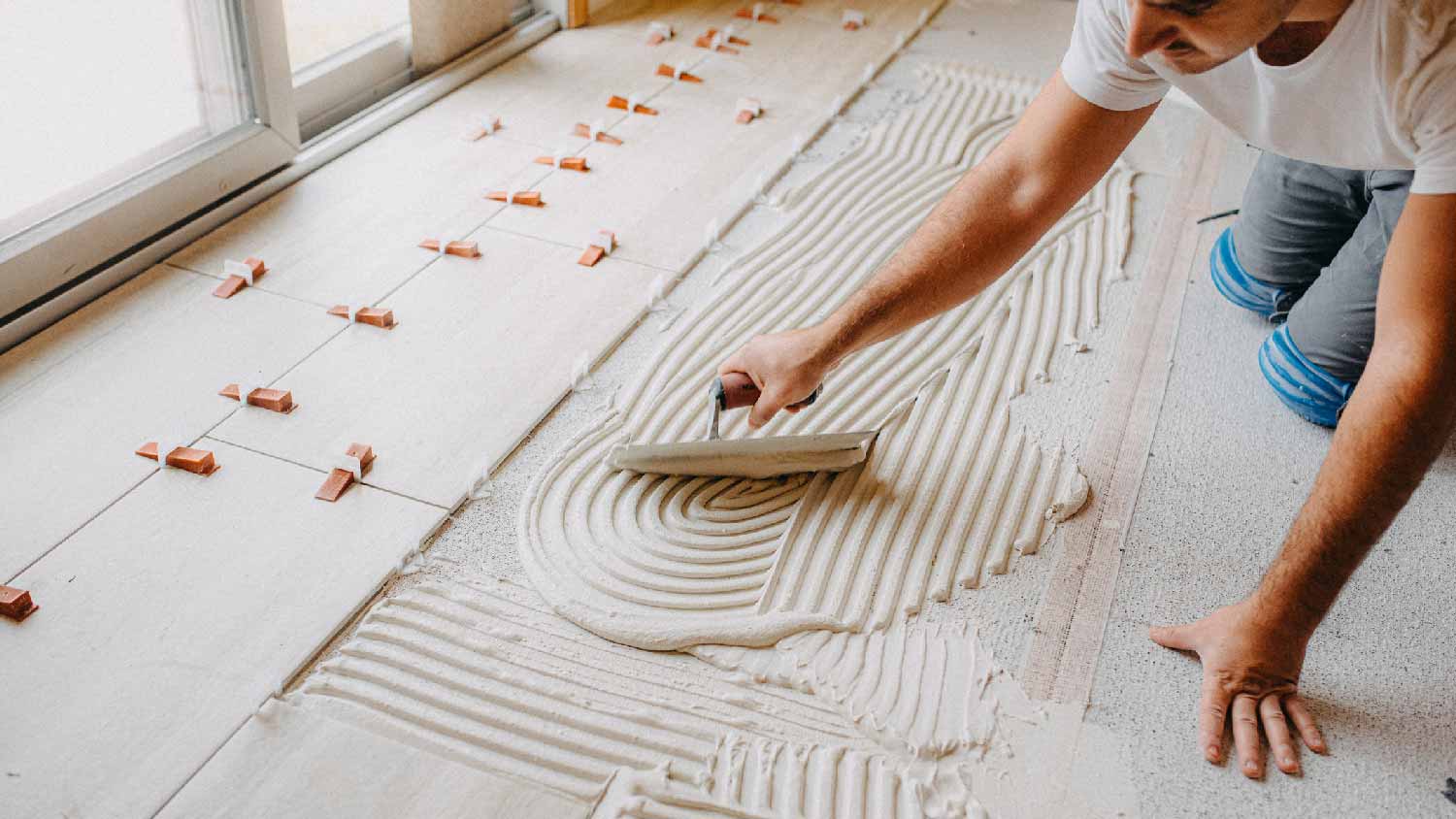
Damaged tiles should be fixed right away. In this guide, find out all of the different factors that affect your tile repair cost.
The cost to regrout a shower averages $1,500, with an average range from $600 to $2,500. Main cost factors include shower size, grout type, labor, and add-ons like tile repair.


The cost to regrout a shower depends on shower size, grout type, and local labor rates.
Regrouting restores shower appearance and prevents water damage.
Ranging from $10 to $35 per square foot, professional regrouting ensures durability and mold prevention.
Add-ons like tile repair or sealing increase total project cost.
Regular maintenance extends the life of your shower grout.
This article was created using automation technology and thoroughly fact-checked and edited by an Angi Editor in accordance with our AI policy.
The cost to regrout a shower averages $1,500, with most homeowners spending between $600 and $2,500 on average. The cost to regrout shower projects depends on shower size, grout type, and labor rates, with prices ranging from $10 to $35 per square foot. Investing in regrouting helps prevent leaks, mold, and expensive repairs down the line.
Understanding the main factors that influence the cost to regrout shower projects helps you set a realistic budget. Let’s look at each driver in detail.
The type of shower you have plays a big role in the cost to regrout shower tiles. Walk-in, alcove, corner, custom, and tub/shower combos each present unique challenges. Large walk-in or custom showers require more time and skill, especially if they feature intricate tile patterns or specialty materials. Multi-surface showers with built-in benches, niches, or shelves require extra labor and precision, which can increase costs. Tighter spaces or unique layouts may also drive up labor fees due to limited accessibility.
Shower size is measured by square footage or tile count. Smaller showers cost less to regrout, while larger or custom showers increase both material and labor costs. Standard showers are 25 to 35 square feet, large showers can reach 50 square feet or more, and custom installations may exceed 70 square feet. Most pros charge $10 to $25 per square foot, and some may offer bulk pricing for larger projects.
| Shower Size | Tile Area (Sq. Ft.) | Average Cost |
|---|---|---|
| Small | Up to 25 | $400–$1,700 |
| Standard | 25–35 | $560–$2,000 |
| Large | 36–50 | $700–$2,200 |
| Custom/extra-large | 50+ | $950–$2,375+ |
Showers need regrouting every eight to 15 years, depending on use and grout quality. Heavy use, poor ventilation, and hard water can shorten this interval. Frequent regrouting increases lifetime maintenance costs, but regular upkeep prevents more expensive water damage or mold remediation. Some service providers offer recurring maintenance discounts, while one-time jobs tend to have higher per-visit costs.
The type of grout used directly affects both price and longevity. Options include cementitious (standard), epoxy, urethane, and premixed grouts. Standard cement grout is most affordable, while epoxy and urethane offer better stain resistance and durability for a higher price. Additives like antimicrobial agents or specialty colors can increase material costs. Beyond grout, you may also need sealers, caulk, and waterproofing agents.
| Grout Type | Description | Average Cost per Unit |
|---|---|---|
| Cementitious | Most common, easy to work with | $15–$35 |
| Epoxy | Highly durable, stain/mold resistant | $40–$100 |
| Urethane | Flexible, premixed, easy to clean | $50–$120 |
| Premixed | Ready to use, less mess | $12–$160 |
Showers are regrouted by tile contractors, handymen, or grout specialists. Labor rates range from $30 to $75 per hour, depending on region and job complexity. High-demand urban markets or jobs requiring mold remediation, tile repair, or difficult access may cost more. Many pros have minimum service fees, which can impact the price for small showers. Labor also includes surface prep, grout removal, and cleanup.
Where you live can impact the total cost to regrout a shower. Urban areas and high-cost states have higher labor and material prices, while rural locations may have fewer contractors but sometimes lower rates. Homes with showers on upper floors or in tight spaces may incur extra fees for transport and setup.
Tipping is not required but is sometimes appreciated for exceptional service. If you choose to tip, $20 to $50 per worker is a common amount for a regrouting job. Alternatives to tipping include offering a positive review, referring friends or neighbors, or providing refreshments on the job.

Most showers need regrouting every eight to 15 years, depending on usage, grout type, and cleaning habits. Showers with heavy daily use, poor ventilation, or hard water may require more frequent attention. Signs you need regrouting include cracked or missing grout, persistent mold or mildew, leaks, or grout discoloration. Seasonal changes in humidity and temperature can also shorten grout life.
To extend grout longevity, clean your shower regularly with gentle cleaners and reseal grout lines every year or two. Quick action at the first sign of damage can prevent more costly repairs later.

Some showers require more than just new grout. Common add-ons include tile replacement or repair, mold remediation, waterproofing, and post-project sealing. Each extra service adds to the total cost but can protect your shower and home from future problems.
| Add-On Service | Description | Average Cost |
|---|---|---|
| Tile repair/replacement | Fixing or swapping out damaged tiles (per tile) | $5–$45 per sq. ft. |
| Mold remediation | Removing mold/mildew from behind or around tiles | $10–$25 per sq. ft. |
| Waterproofing membrane | Installing or repairing waterproofing layer | $50–$1,000 |
| Caulking/sealing | Sealing corners, joints, and edges | $65–$300 |
| Disposal fees | Removing old grout, tile, and debris | $50–$150 |
| Post-project cleaning | Deep cleaning or sealing after regrouting | $0.05–$3 per sq. ft. |
Some homeowners consider DIY regrouting to save money. The main costs for DIY include grout, tools (grout saw, float, and sponge), mask, gloves, and your time—expect to spend eight to 16 hours on the project. DIY requires patience, a steady hand, and attention to detail. Risks include uneven grout lines, improper sealing, or accidental tile damage, which can lead to leaks or voided warranties.
Hiring a shower grouting pro costs more but brings expertise, speed, and a warranty on workmanship. Pros have specialized tools and know how to spot underlying issues before they become costly repairs.
There are several ways to keep your regrouting project affordable without sacrificing quality:
Remove old grout yourself: If you’re comfortable with hand tools, carefully removing old grout can save on labor costs. Use a manual grout saw or oscillating tool, wear protective gear, and work slowly to avoid chipping tiles. Always vacuum dust and debris before new grout is applied.
Choose standard grout: Standard cementitious grout is both durable and affordable for most showers. Select neutral colors to avoid custom mixing charges, and look for products with built-in stain resistance or antimicrobial properties to boost longevity.
Ask about off-season discounts: Schedule regrouting during off-peak seasons when contractors are less busy.
Compare contractor rates: Get multiple quotes from local shower regrouting professionals to compare rates and services.
Practice proper upkeep: Maintain grout with regular cleaning and sealing to extend time between full regrouting jobs.
Bundle services: If your bathroom needs more than just regrouting, ask about bundling repairs. Combining tile replacement, caulking, or waterproofing with regrouting can lead to package discounts and minimize disruption.
Home is the most important place on earth, which is why Angi has helped more than 150 million homeowners transform their houses into homes they adore. To help homeowners with their next project, Angi provides readers with the most accurate cost data and upholds strict editorial standards. We extensively research project costs to develop the pricing data you see, so you can make the best decisions for you and your home. We rely on reputable sources, including the U.S. Bureau of Labor Statistics, academic journals, market studies, and interviews with industry experts—all to ensure our prices reflect real-world projects.
Want to help us improve our cost data? Send us a recent project quote to [email protected]. Quotes and personal information will not be shared publicly.
From average costs to expert advice, get all the answers you need to get your job done.

Damaged tiles should be fixed right away. In this guide, find out all of the different factors that affect your tile repair cost.

You're planning a bathroom remodel, but how much will it cost to retile your bathroom? Read this guide to find out.

Discover the average cost of grout repair, key price factors, and tips to save. Get expert advice to plan your grout repair project with confidence.

Calculating how much thinset you need involves multiple steps. Use this guide to determine exactly how much of the bonding material you’ll need.

Caulk and sealant are both helpful for closing gaps, but they aren’t the same thing. Find out whether caulk versus sealant is a better choice for your project.

You've figured out which tiles you want, but what about the details? This guide will help you figure out how to choose tile trim that will best suit your home.